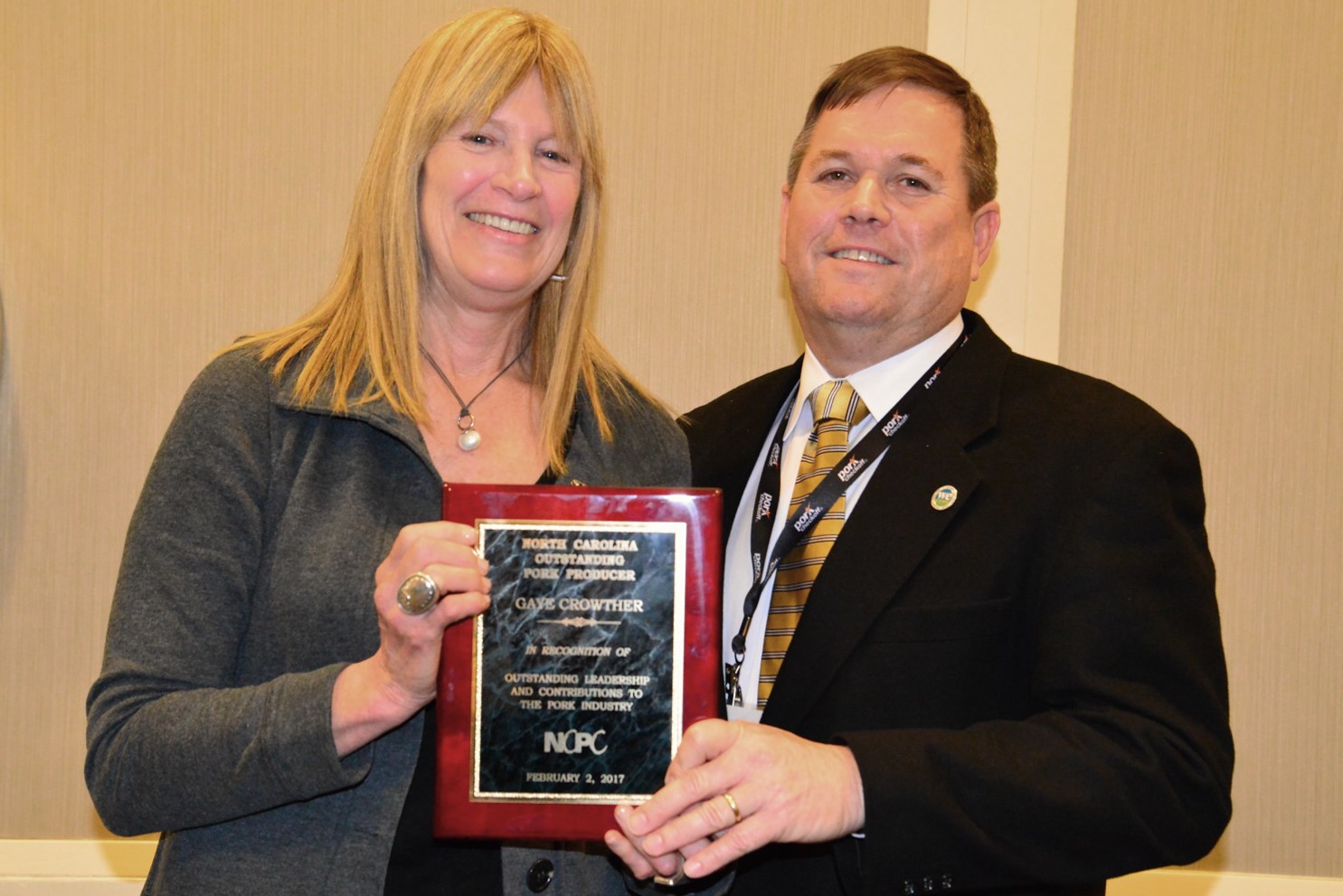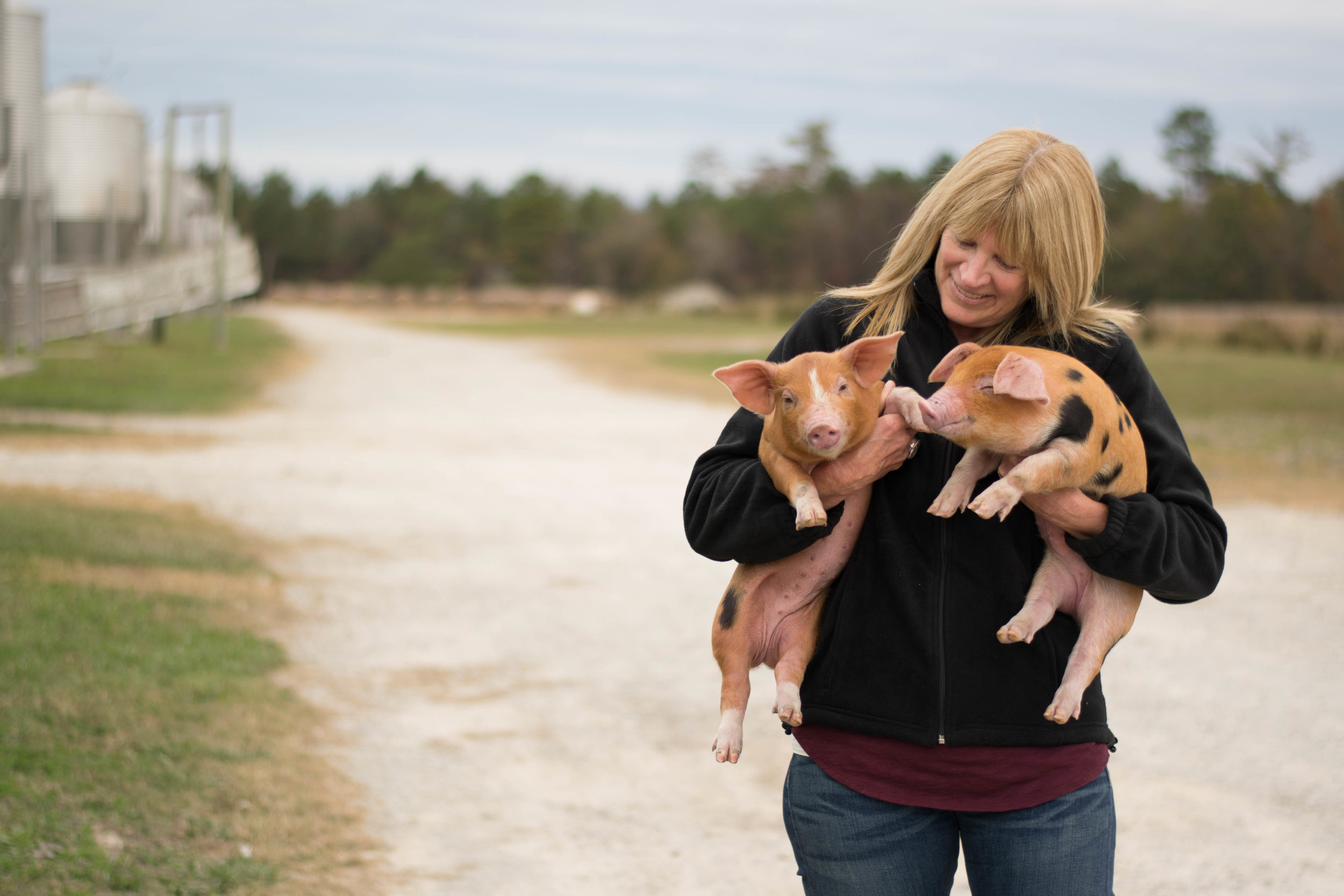 Meet Gaye Crowther, a family farmer from Tabor City. Gaye recently received North Carolina’s Outstanding Pork Producer award, which recognizes industry leaders for exceptional management and outstanding contributions to the state’s pork industry. The NC Pork Council honored her with this award.
Meet Gaye Crowther, a family farmer from Tabor City. Gaye recently received North Carolina’s Outstanding Pork Producer award, which recognizes industry leaders for exceptional management and outstanding contributions to the state’s pork industry. The NC Pork Council honored her with this award. If you've ever visited Gaye's farm, it will be of no surprise that she truly is an outstanding pork producer. Not only does she work hard every day to run the farm to it's full potential, but she is passionate about her farm and all the animals on it. She loves it.Although she grew up as a city girl, Crowther always had a deep love for animals. Shortly after graduating from Auburn University, she moved to North Carolina to work for Murphy Farms and managed the company’s first 1,000-sow farrow-to-feeder farm.“Gaye is an exceptional pork producer who represents our industry well,” said Andy Curliss, chief executive officer of the NC Pork Council. “She is dedicated to promoting the industry and always looking for ways to make it stronger.”Gaye started Seawright Farms, a 3,400-sow farrow-to-wean farm, in 1993 and Sea Gro, a 2,000-sow farrow-to-feeder farm, in 2004. In addition, she operates Sea Blu, a 40-acre blueberry farm, and runs a 100 head cow-calf operation.
If you've ever visited Gaye's farm, it will be of no surprise that she truly is an outstanding pork producer. Not only does she work hard every day to run the farm to it's full potential, but she is passionate about her farm and all the animals on it. She loves it.Although she grew up as a city girl, Crowther always had a deep love for animals. Shortly after graduating from Auburn University, she moved to North Carolina to work for Murphy Farms and managed the company’s first 1,000-sow farrow-to-feeder farm.“Gaye is an exceptional pork producer who represents our industry well,” said Andy Curliss, chief executive officer of the NC Pork Council. “She is dedicated to promoting the industry and always looking for ways to make it stronger.”Gaye started Seawright Farms, a 3,400-sow farrow-to-wean farm, in 1993 and Sea Gro, a 2,000-sow farrow-to-feeder farm, in 2004. In addition, she operates Sea Blu, a 40-acre blueberry farm, and runs a 100 head cow-calf operation. She has been actively involved with the pork industry at the local, state and national level, including the N.C. Pork Council and the National Pork Producers Council. She currently serves on the N.C. Pork Council board of directors and the Grower Council for the Smithfield Hog Production Division.“I’m grateful to be part of an industry that has such great leadership and so many growth opportunities,” Gaye said.Congratulations to Gaye! She certainly deserves to be recognized for her many years of hard work both on the farm and for the hog industry.
She has been actively involved with the pork industry at the local, state and national level, including the N.C. Pork Council and the National Pork Producers Council. She currently serves on the N.C. Pork Council board of directors and the Grower Council for the Smithfield Hog Production Division.“I’m grateful to be part of an industry that has such great leadership and so many growth opportunities,” Gaye said.Congratulations to Gaye! She certainly deserves to be recognized for her many years of hard work both on the farm and for the hog industry. *Photos originally appeared in the NC Pork Report
*Photos originally appeared in the NC Pork Report
News Article
Let's Shoot Straight Mr Dove
The Waterkeepers leader in North Carolina, Rick Dove, just posted a comment on Farm Families’ Facebook page, and he doesn’t like our video Eighteen Years Ago.Our video tells the story of what happened, almost twenty years ago, when Mrs. Elsie Herring complained about a hog farmer spraying too close to her home: How the company investigated her complaint, agreed with her, moved the farmer’s irrigation equipment and planted a wide buffer of trees between her home and the farmer’s field.That happened almost twenty years ago. But, a few months ago, one of the Waterkeepers’ allies reported, on its website, the farmer was spraying too close to Mrs. Herring’s house now.We made a video to set the record straight. And Rick Dove didn’t like that. He claimed our video was “alternative facts.” Here’s the video so you can judge for yourself:
Not long ago, Rick Dove had a problem with ‘alternative facts’ himself.The morning after Hurricane Matthew, Dove set out to spin a story to the press about an environmental disaster – and blame it on hog farmers. So he climbed into an airplane to fly over flooded farms to take photographs.We know now, according to state records, only one half of one percent of the lagoons on hog farms were inundated during the floods. One other lagoon on a shuttered hog farm (that hasn’t had a hog on it in five years) had two minor ‘breaches.’
In all, on 99.5% of the hog farms, nothing happened to harm the environment. But that wasn’t the picture Rick Dove and the Waterkeepers wanted to paint. So he resorted to a ruse: He posted nine pictures, all taken from a plane, all taken at different angles, of one flooded farm. But he didn’t explain, This is one farm. He posted four pictures of another farm, two of another, four of another. Dove even posted a picture of a flooded municipal waste treatment plant in Hookerton and called it a hog farm.Dove then spun his story to the press. The Washington Post even published Rick Dove’s photo of a flooded municipal waste treatment facility in Hookerton and called it a hog farm.Those were “alternative facts.” And Rick Dove hasn’t set the record straight.
Hog Farmers Ruin Lives: An Untruthful Story about Elsie Herring
One of the new videos from the Waterkeeper Alliance tells a heartbreaking story… or, at least, the story would be heartbreaking if it was true. When the Waterkeepers climb up on their soapboxes, they like to depict hog farmers as villains who don’t care about “racial injustice.” To prove their point, they like to tell the story of Elsie Herring, an African-American woman in Sampson County who lived near a hog farm.
Back in 1998, Mrs. Herring had a legitimate complaint: The hog farmer next door was spraying too close to her home.Here’s what happened: Mrs. Herring took her grievance to the farmer, the company investigated, and agreed. Mrs. Herring was right. The farmer then moved his irrigation equipment further away from Mrs. Herring’s house, stopped spraying close to her home, and the company planted a grove of trees between her home and the farmer’s field as an additional buffer. Eighteen years later, that story took an odd turn. The Waterkeepers, along with one of their allies, posted a “report” on the Internet saying a farmer was spraying waste eight feet from Elsie Herring’s kitchen window… not 18 years ago. But now. Today. The Waterkeepers took a mistake that had happened almost two decades ago – and told people it is happening now. Here’s a photograph of Mrs. Herring’s home today.
The trees planted years ago have now grown into a forest so thick you can’t see the farmer’s field from her house. This is a photograph of the farmer’s field on the far side of the trees.
And this aerial photo shows that the farmer’s irrigation doesn’t come any closer to the house than nine hundred feet* – not eight feet like the Waterkeepers claimed.
And here’s a video that tells the entire story.
Hog farmers aren’t perfect. But they are honest, hard-working people. And when they make a mistake they fix it. Just like that farmer did 18 years ago.The Waterkeeper Alliance is just playing politics. The hard part is, when the Waterkeepers play politics, a lot of hard-working farmers get hurt.
*Update: this distance has been changed from 200 to 900 feet to represent the most current situation. Regardless, the claim of 8 feet is false.




